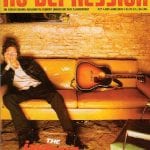Pee Wee King: 1914 to 2000
Back about 30 years ago, when I was first really immersing myself in country music, I bought a 78rpm record of singer Sue Thompson, and promptly fell in love — not with Thompson, though she was a fine singer, but with the song. “See the pyramids along the Nile, watch the sun rise on a tropic isle,” it began, and with its dreamy, quasi-sophisticated lyrics and lush melody and chord structure, “You Belong To Me” made me a lifelong sucker for a pretty, pop-inflected country song. Like “Tennessee Waltz”, a song as popular as just about any written in the 20th century, it was co-written by Country Music Hall Of Famer Pee Wee King, who passed away March 7 in Louisville, Kentucky, at the age of 86.
Born Julius Frank Anthony Kuczynski in Milwaukee, King started his musical career as an accordionist in his father’s polka band; before he finished high school, he had changed his name to Frankie King and started his own outfit. In 1934, he moved to Louisville at the behest of another Hall Of Famer, promoter J.L. Frank, who put him to work for Gene Autry, yet to make his mark as a movie cowboy. When Autry headed for Hollywood, King stayed behind; like Autry he saw opportunity in the imagery of the west. He formed the Golden West Cowboys in Knoxville in 1937 and moved to Nashville, where he soon found a place on the Grand Ole Opry. There his band was among the first to adopt stagewear created by the legendary tailor Nudie, and one of the first to bring drums and electric instruments to the Opry.
Returning to Louisville in 1947, King continued to break new ground, becoming one of the first country performers to make regular television appearances (“The Pee Wee King Show” had a six-year run on ABC). He made a solid run at the country charts over the next few years, putting his own version of the “Tennessee Waltz” near the top in 1948 (Patti Page took it to #1 three years later) and scoring big with “Slow Poke”, which spent almost four months at #1. Still, as the country music industry consolidated and grew in Nashville, King paid a price for leaving town, and though his recording career eventually covered more than twenty albums and 157 singles, he never made the charts after 1954.
But the Country Music Hall Of Fame recognized the role King played in shaping the music, especially during the critical period of the late 1940s and 1950s. The sound of the Golden West Cowboys was just about irresistible, a “smooth, well-executed version of Western Swing…that anticipated the country-pop sounds of the late fifties and early sixties,” as historian Bill Malone put it in his notes to last year’s excellent 2-CD set of 1952 transcriptions, Pee Wee King’s Country Hoedown (Bloodshot Revival/Soundies). King’s music, which combined mostly twang-free vocals and polished arrangements with prominent fiddle and steel guitar, revealed an almost subterranean connection between the tastes of rural, Southern communities and those of Midwestern, urban ones.
Country music has never forsworn the influence of pop music for hillbilly purity. In his ability to walk the line — his there-but-for-fortune “Thy Burdens Are Greater Than Mine” became a bluegrass classic, and “Tennessee Waltz” has been recorded by as many bluegrass acts as pop-leaning ones — Pee Wee King was a remarkably significant artist. Though it’s easy enough to simply enjoy his amiable, appealing music, his work also reminds us that, for better or worse, creativity has a way of ignoring the rules.




